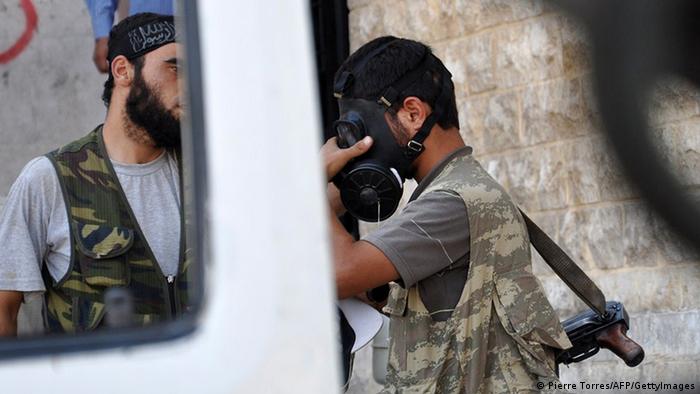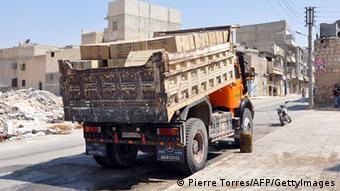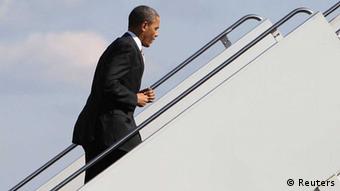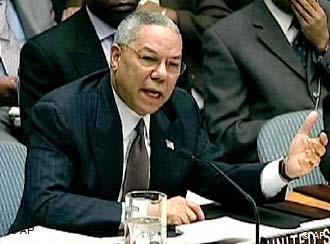The pressure on Barack Obama is growing. After the latest intelligence reports on the use of chemical weapons in Syria, more and more of Washington is calling for military action. But the president remains hesitant.
Has the Assad regime in Syria finally crossed Barack Obama's much-cited "red line," which the president often drew at the use of chemical weapons? It has as far as Senator John McCain is concerned, after the newest reports emanating from the US secret service seemed to show that Assad had used the nerve gas sarin against his own people. He and other Republicans are now calling for stronger military engagement in the region.
But those intelligence reports are far from clear-cut. They allow room for interpretation, and so leave open the chance to maneuver into different political options. That seems intentional, for it gives Obama and his European allies time to find a position. All the White House has said so far is that the US has "varying degrees of confidence" in the evidence that toxic gases have been used on "a small scale."
Military intervention unlikely
Although Obama has repeatedly threatened dictator Bashar al-Assad with consequences, it's highly unlikely that the US will send ground troops into Syria, according to Charles Mallory of the policy studies organization The Aspen Institute. "I'm doubtful because I don't believe the American public has the appetite for further intervention in the Middle East after ten years of being there," he told DW. "My bet would be that there would be moves to condemn Syrian behaviour at the United Nations."
Moreover, the US also has the option of imposing even stricter sanctions on Syria. "But it strikes me at the moment that unless some horrible television images such as Halabja suddenly become available, it's not going to lead to US intervention," said Mallory, referring to Saddam Hussein's infamous use of chemical bombs on the Kurdish town of Halabja in Iraq in 1988, when more than 5,000 people were killed.
Mistrusting the CIA
Any parallels with Iraq stir bad memories for Washington. In 2003, then US Secretary of State Colin Powell presented intelligence reports to the UN Security Council supposedly proving that Iraq possessed weapons of mass destruction. Those reports proved to be false.
That's why it has become essential for Obama and his European allies to demand solid information and call for a UN inspection on the ground. Mallory also believes there are other options below the level of direct intervention. "One of which would be further arming and supporting the rebels," he said. "Another would be to provide support to Turkey, Qatar, and Saudi Arabia. I don't think it's a case of either intervene or not intervene. I think there's a range of policy options that are available to the president."
Bruce Riedel, of the renowned American think tank the Brookings Institution, points out that one of the reasons that Obama was elected was to end the wars in Iraq and Afghanistan, not to start a new one. Since there is neither a great enthusiasm for war in the US, nor an international mandate - China and Russia would presumably veto any declarations by the UN Security Council - Riedel also doubts that it will come to military intervention.
'Humiliation' for Obama
But at the same time, Riedel argues that Obama must make sure that his warnings are still taken seriously in the region. Even at this stage, Riedel fears that Obama is putting himself in a "humiliating" position, which will not only damage his negotiating power when it comes to the Syria conflict, but also in dealing with Iran, with whom the US has an ongoing dispute over its nuclear program. "I think for a long time the Iranians have thought America was bluffing and Israel doesn't have the capability to carry out a really thorough mission," he said. "And they may be reinforced in that view by this."
John Boehner, a Republican and current Speaker of the House of Representatives, has already spoken of a weakening in the US position because of the ambiguity with which the Obama administration has interpreted its "red line." He went on to accuse the administration of "outsourcing national security to the United Nations," according to the Washington Post.
Despite this, it is likely that from now on the US will work closer with two multilateral organizations: besides the UN, Obama can also cooperate with NATO, where Germany, France, and Britain all wield significant military power. But those countries are still a long way from deciding whether they will use it on Syria, as they did in the case of Libya - let alone whether they would send in ground troops. dw de




Comments